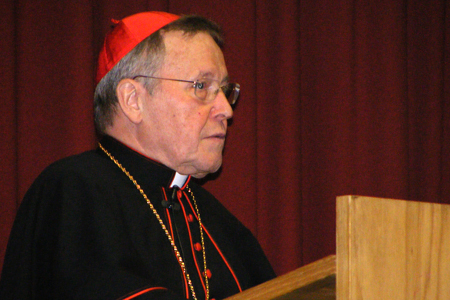Disordered Intentions
“Homosexuality is a disordered behavior.”
Walter Cardinal Kasper made the remark during a July 31, 2008 address at the Lambeth conference, the once-a-decade gathering of the world’s Anglican bishops in Canterbury, England. Cardinal Kasper stressed to the bishops that the dialogue between the Anglican Communion and the Roman Catholic Church had been seriously compromised over the issues of women’s ordination and homosexuality. 
Kasper, who is president of the pontifical council for promoting christian unity, reminded the delegates of the catechism of the Roman Catholic Church on homosexuality: “This teaching is founded in the Old and New Testament and the fidelity to scripture and to Apostolic tradition is absolute.”
Maintaining a common approach on homosexuality is not the main Vatican concern with an Anglican split. It is the issue of married priests; and with it, the ordination of women priests and bishops.
As more married Episcopalian priests flood into the Catholic church, Catholic parishioners and priests will become more and more restive about the issues of married clergy and women priests.
Francis DeBernardo, executive director of New Ways Ministry, countered Cardinal Kasper’s remarks by pointing out the Vatican’s view would uphold only “a particular interpretation of those texts which supports Catholic teaching. Many scripture scholars, Catholic and Protestant, find that those texts do not refer to our contemporary understanding of homosexuality or to the concept of a loving committed relationship. The texts only refer to abusive sexual activity.”
As for the claim of apostolic tradition, DeBernardo said that tradition “has been evolving constantly over the centuries, even in regard to homosexuality. ” In an earlier era, he said, the church did not claim, as it now does, that homosexuals “had to be respected because of their instrinsic human dignity. That was an evolution in the tradition.” If that sort of evolution can occur, he asks, “why can’t it also change in the area of sexual activity in the context of a committed relationship?”
